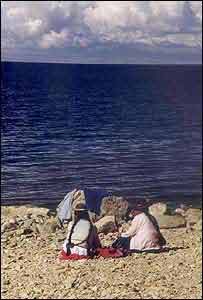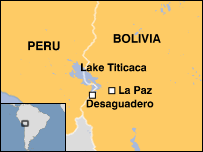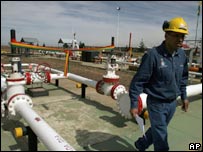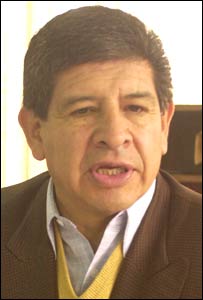Smuggling drains Bolivia of oil riches
March 21, 2008 - BBC
News
By Andres Schipani, BBC News, Desaguadero
 (right)
Women sit on the shores of Lake Titicaca. The area around Lake Titicaca
is seeing a lot of oil smuggling
(right)
Women sit on the shores of Lake Titicaca. The area around Lake Titicaca
is seeing a lot of oil smuggling
It is a busy market day in the Bolivian town of Desaguadero, situated right by Lake Titicaca on the border between Bolivia and Peru.
Bowler-hatted indigenous women are selling everything from Chinese cigarettes to fresh mangoes.
Down the road, on the banks of the River Desaguadero that feeds into the lake, people are also busy trading, but the quality of the exchange is quite different.
Two men are loading a small white, red and blue boat on the Bolivian bank of the river.
About 50m away, on the Peruvian side, Cecilio Flores is anxiously waiting to load his precarious tricycle with the 20-litre barrels being hauled aboard.
Government subsidies
Mr Flores transports up to 10 loads
of subsidised Bolivian diesel oil each day.
 (right-
map)
(right-
map)
"I can make about one [Peruvian] sol per litre. If you multiply that by the 200 litres I am about to get, I make about 200 soles (£34; $70) per load," he told the BBC.
"And the guys that are carrying it from the Bolivian side make about the same. It is good business for poor countries like ours," Mr Flores said. "Bolivian oil is just too cheap to be true."
Government subsidies mean Bolivia has the lowest retail price for oil in South America - about 50 US cents a litre.
Those subsidies have boosted the smuggling business, as the price of diesel oil in border countries such as Brazil and Peru, are up to four times the Bolivian price.
Bolivia is South America's poorest country but has the second-biggest reserves of gas and oil after Venezuela.
Energy crunch
In May 2006, Bolivia's first indigenous president,
Evo Morales, nationalised its oil and gas resources to "return them to the people".
"Smuggling is a national habit, but we are going to suffer from it as long as we keep prices artificial." --Carlos Toranzo |
But officials now realise that oil smuggling is having a big effect.
In recent months, supply has been too limited to satisfy the needs of the population, and with the southern hemisphere's winter approaching, for many there are fears of an energy crunch.
"The problem is now directly affecting the Bolivian state," said Colonel Ramiro Mendoza, head of customs operations.
Given the impact of smuggling on state revenues, Mr Morales' s government has moved to tackle the crime, including running a major television advertising campaign and having military patrols at petrol stations.
"We see we are almost subsiding neighbouring countries with cheap oil" --Carlos Villegas |
"We are losing about 300 cubic metres of diesel oil a day," said Carlos Villegas, the minister of hydrocarbons.
That represents about $55m in annual losses for the Bolivian state, which every year subsidises the oil industry to the tune of some $190m.
As international oil prices hover over $100 a barrel, the Bolivian government is keeping the price of crude oil at $27.11.
To meet domestic demand, the authorities have to import 30% of the country's needs, mostly from key partner Venezuela, at international prices.
That seems to be the root of the problem.
"The Bolivian state is turning into a protectionist one, fixing oil prices that do not match international market prices," said Carlos Toranzo, an economist at the Latin American Institute of Social Research in La Paz.
"Smuggling is a national habit, but we are going to suffer from it as long as we keep prices artificial," he said.
New refineries
The government recognises the scale of the
problem.
"As price differences are so significant, we see we are almost subsiding
neighbouring countries with cheap oil of ours that leaves the national
territory illegally," said Mr Villegas.
 (right)
A Transredes oil worker walks past a gas pipeline in Bolivia, Nov 1 2007.
Bolivia depends heavily on its oil and gas industry
(right)
A Transredes oil worker walks past a gas pipeline in Bolivia, Nov 1 2007.
Bolivia depends heavily on its oil and gas industry
But it seems the challenge of producing oil has taken precedence over clamping down on smuggling.
"What we are going to do is to expand two refineries and set up a new one. This will allow us to be self-sufficient despite smuggling. But we won't get there until the year 2010 or 2011," Mr Villegas said.
But for some this is not an issue that supply will solve.
"The problem is having artificial prices that are too seductive for smugglers," said Mr Toranzo.
